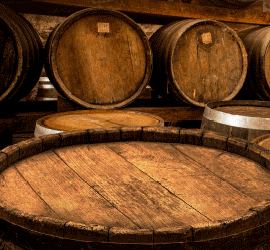Statistics
Statistical information from The 2024 Australian and New Zealand Wine Industry Directory
Click here to purchase your copy now and to access WID online searchable databases
Highlights of 2024
- Australian wine exports increased by 34 per cent in value to $2.39 billion, and by 7% in volume to 643 million litres, in the 12 months ended September 2024.
- Shipments reached the highest levels for both volume and value since the 12 months ended August 2021, with this renewed growth driven by the re-entry of Australian wine exports to mainland China after it removed import duties on Australian bottled wine in late March 2024.
- The value of shipments to mainland China, in the 12 months to September 2024, increased by $604 million to $612 million, while volume increased by 58 million litres to 59 million litres. There were 927 businesses exporting wine to mainland China during the 12 months ended September 2024.
- The Australian winegrape crush increased yearon-year by 9% in 2024 to an estimated 1.43 million tonnes, according to the National Vintage Report 2024 released by Wine Australia.
- Vintage 2024 followed a 23-year low crush in 2023 and, despite the growth, the ‘24 crush is still well below the 10-year average of 1.73 million tonnes.
- The overall year-on-year increase in the crush was 112,000 tonnes, driven entirely by white winegrape varieties, which increased by 117,000 tonnes (19%) to 722,000 tonnes.
- Despite the increase, the white varieties crush was still 10% below the 10-year average and the second smallest in 17 years.
- The crush of red grapes declined by just under 5,000 tonnes (1%) to 705,000 tonnes, the smallest since the drought-affected 2007 vintage, and 40% below its peak of 1.2 million tonnes in 2021.
- The white winegrape share of the crush increased to 51% – the first time since 2014 that the white crush has been higher than the red crush.
- Chardonnay increased by 31% to 333,000 tonnes, overtaking Shiraz to resume the title of largest variety by crush size that it last held in 2013. Shiraz decreased by 14% to 298,000 tonnes – its smallest crush since 2007.
- South Australia accounted for the largest share of the national crush size (49%) but decreased by 4% and lost 6 percentage points of share to the other states.
- All other states except Western Australia increased their crush compared with 2023, with Tasmania increasing by 42% to a record estimated crush of 16,702 tonnes.
- The grape crush value of the 2024 vintage was estimated to be $1.01 billion, a 2% increase over the previous year. This was a result of the 9% increase in the tonnage being offset by an overall decrease in the average value from $642 per tonne to $613 per tonne.
| Snapshot | 2021 | 2022 | 2023 | 2024 | Change (%) | |
| Winegrape intake | (tonnes) | 2,005,155 | 1,734,260 | 1,317,098 | 1,427,008 | 9% |
| Total value Australian crush | (A$ billion) | 1.56 | 1.46 | 0.98 | 1.01 | 2% |
| Average purchased grape price | (A$/tonne) | 701 | 630 | 642 | 613 | -5% |
| Exports (year to June) | (ML) | 693 | 625 | 620 | 619 | 0% |
| (A$ million) | 2,559 | 2,082 | 1,864 | 2,188 | 17% | |
| (A$/L) | 3.69 | 3.33 | 3.00 | 3.35 | 18% | |
| Imports (year to October) | (ML) | 109 | 102 | 106 | 87 | -18% |
| (A$ million) | 902 | 930 | 1,009 | 890 | -12% | |
| (A$/L) | 8.27 | 9.11 | 9.54 | 10.23 | 7% |
Table 1: Winegrape crush by year
| Year | Estimated Tonnes | % change |
| 2016 | 1,850,133 | |
| 2017 | 1,998,099 | 8% |
| 2018 | 1,769,291 | -11% |
| 2019 | 1,710,962 | -3% |
| 2020 | 1,546,079 | -10% |
| 2021 | 2,013,474 | 30% |
| 2022 | 1,737,820 | -14% |
| 2023 | 1,314,618 | -24% |
| 2024 | 1,427,008 | 9% |
Source: Wine Australia 2024 National Vintage Report
Note: figures may vary from those previously published as data is updated
Table 2: Winegrape production and prices
| Vineyard area (‘000 ha) | Crush (kt) | Average price ($/t) | |
| 2017-18 | 146 | 1769 | 611 |
| 2018-19 | 146 | 1711 | 661 |
| 2019-20 | 146 | 1546 | 694 |
| 2020-21 | 146 | 2013 | 701 |
| 2021-22 | 146 | 1738 | 630 |
| 2022-23 | 146 | 1315 | 642 |
| 2023-24 | 146 | 1427 | 613 |
Source: Wine Australia National Vintage report 2024 and National Vineyard Scan 2019

















